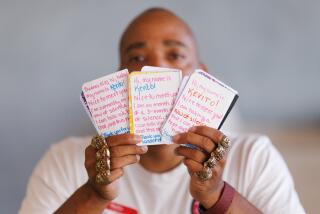The Inescapable Wages of Silence : AIDS: The refusal to acknowledge and talk frankly about black behavior-- homosexual, bisexual and straight--is suicide.
- Share via
Black America’s response to the AIDS epidemic has been much like that of a child besieged by imagined demons in the dark: To lie still and remain absolutely quiet is assumed to be an effective defense against the terror that, hopefully, will disappear by day.
The nightmare of AIDS, of course, is no fiction of the mind but one of America’s, indeed the world’s, most devastating modern realities. Not surprisingly, despite pervasive denial, African-Americans have suffered and are dying in this epidemic in alarmingly disproportionate and ever-worsening numbers.
Denial and silence, nevertheless, persist as the preferred defense mechanisms for black individuals and communities struggling to cope. The disclosures of HIV infection by Magic Johnson and more recently by Arthur Ashe thus constitute a significant breach of black America’s increasingly dysfunctional defense against the epidemic.
At the same time, however, their disclosures underscore the continuing sexuality-based stigma of the disease by which those afflicted are divided into Manichean categories of the morally innocent (primarily heterosexuals who are accorded public sympathy and support) and the deservingly damned (homosexuals and drug users), who remain shunned.
Now that the reality of AIDS in the black community is finally beginning to emerge from the closet, black gay men in particular--the primary sufferers of the disease among African-Americans--are being muscled aside at the closet door and thrust conveniently out of the public spotlight.
The painful irony of this situation is that we were the first to wake up to the threat of AIDS to African-Americans at large, the first to begin critical advocacy for community-wide education and prevention programs as well as better access to health care and experimental treatments.
But mainstream black America, because of the powerful role of the church and a general historic aversion to public discussions of black sexuality, remained publicly indifferent to the disease, seeing AIDS as simply the wages of sexual sin. At the same time, black gay men warned of the inescapable wages of silence; our refusal to acknowledge and talk frankly about real black behavior--homosexual, bisexual and straight--was, in the face of the epidemic, suicide.
The poison of homophobia thus afflicted not just gay men but paralyzed the entire black community, rendering us time and again unable to speak or act against the inevitable encroachment of the virus.
This message unfortunately still seems too often lost on the mainstream press as well as black public figures. Last July, an impressive array of national and regional black gay AIDS advocacy groups arranged hearings before the Congressional Black Caucus on the worsening fallout of AIDS across black America. The cumulative testimony abundantly demonstrated the urgent need for leadership in this escalating health catastrophe. Only two House members, however, bothered to show up.
Much newspaper print has been devoted to the problematic ethics of journalists probing intrusively into Arthur Ashe’s private life. Few, however, have questioned the no less troubling ethics of Ashe’s prolonged public silence in the face of this killer epidemic or how a myopic insistence on the right to privacy fuels the grossly distorted perception that black people, by and large, remain unaffected, or worse, that AIDS is something you’re not supposed to talk about publicly. Even fewer question the wisdom of those friends and colleagues in the media who assisted Ashe in what he himself termed a “generous conspiracy” of silence.
True, the conspiracy has been generous and has shielded countless others before Ashe and will likely continue to do so in the foreseeable future. For the delusion of self-protection, however, this conspiracy exacts a terrible price: It perpetuates the invisibility of AIDS in black communities, reinforcing the dangerous myth of black immunity, while exacerbating the shock, fear and loathing many still feel whenever they confront the human face of AIDS, especially when it is black.
In Africa, a similar kind of conspiratorial silence has helped decimate whole villages and townships, where the only residents left are young children and the elderly.
Black America need not repeat this tragedy. But inevitably we will if we continue to reserve support for a select, heterosexually identified few. This nightmare will end only when we wake up to total impact of AIDS on our lives and begin to understand and educate ourselves about the diverse sexualities that exist in the world. Without this change, the monster virus will most certainly continue to kill, its equally lethal accomplice our entrenched, communal silence.


